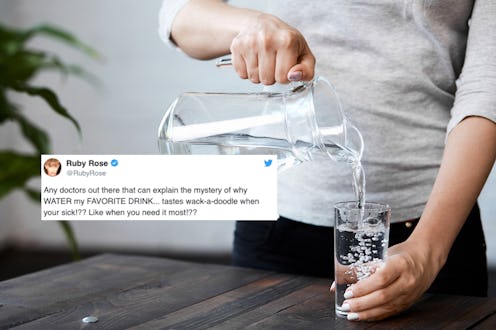
We know that we're supposed to rest and drink water when we get sick, but it's often easier said than done — and if you're like actor and model Ruby Rose, water might even taste off to you when you're feeling under the weather. Rose took to Twitter to ask a very legitimate question: Why does water taste bad when you're sick? And that got us thinking about it — seriously, why is this a thing?
You probably know how when you're sick, your mouth can feel dry, stale, and all around gross. For people whose sense of taste is impaired when they're sick, water can do the opposite of alleviate this gross mouthfeel. Rose followed her tweet up by saying water tastes "sweet and soapy" to her when she's sick, so we tried to figure out why this happens.
"Having a cold or bad allergies can change your sense of taste," Niket Sonpal, an NYC-based internist and gastroenterologist, and adjunct assistant professor at Touro College of Osteopathic Medicine, tells Bustle. "If you have a post-nasal drip, mucus is dripping from the back of your nose to your throat, mixing with your saliva and making everything taste salty."
That said, the explanation may be a bit more complicated than that.
"If your illness affects your sense of smell, that could also affect your taste buds," Dr. Sonpal tells Bustle. "Sick people tend to produce more of the regulatory protein tumor necrosis factor or TNF, which is released by the immune system to help fight off inflammation due to an illness or disease. The protein is also responsible for increasing sensitivity to taste, making food extra bitter and far less appetizing, according to researchers."
According to the National Institute of Health, "dysgeusia" is the official term for a "distortion or absence of the sense of taste." It can be caused by a ton of things, including chemotherapy and even pregnancy, but it can also be caused by infections. A 2015 study from the Monell Chemical Senses Center in Pennsylvania examined how the regulatory protein TNF in our immune systems can be responsible for your food tasting differently. The study focused on people with long-term illnesses, but the results can still be useful when we're talking about short-term sickness.
“Reduced food intake and associated malnutrition is a significant concern that affects the long-term prognosis of many people who are very ill,” said senior author Hong Wang, PhD, a molecular biologist at Monell, in the study's press release. “Our findings reveal that bitter taste is regulated by the immune system. Specifically, TNF may make sick people more sensitive to bitterness so that foods taste more bitter and less appetizing.”
But, as Dr. Sonpal tells Bustle, yet another reason that your sense of taste may be messed up is because your sense of smell is affected when you're not feeling well. Your senses of smell and taste work hand-in-hand, so if you aren't able to smell anything, your taste buds will be affected as well. From the National Institutes of Health:
Most people who think they have a taste disorder actually have a problem with smell. When you chew food, aromas are released that activate your sense of smell by way of a special channel that connects the roof of the throat to the nose. If this channel is blocked, such as when your nose is stuffed up by a cold or flu, odors can’t reach sensory cells in the nose that are stimulated by smells. As a result, you lose much of our enjoyment of flavor. Without smell, foods tend to taste bland and have little or no flavor.
So, there you have it: There are a few possible reasons, all of which are unpleasant. Even if water tastes gross to you when you're sick, you should still make it a priority to stay hydrated (and TBH, even when you're well, too).
And if your sense of taste is off when you're sick, take solace. Not only will it likely go away within a few days, but even celebrities can relate to your struggles.
This post was originally published on May 15, 2018. It was updated on June 5, 2019.
This article was originally published on